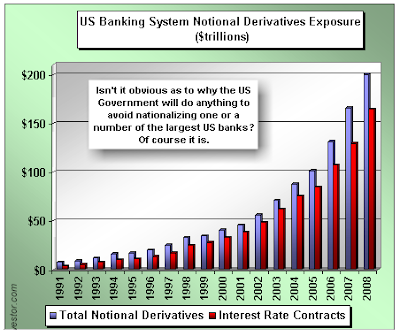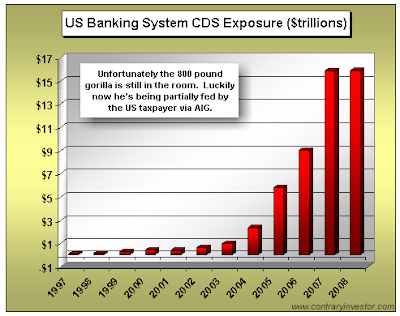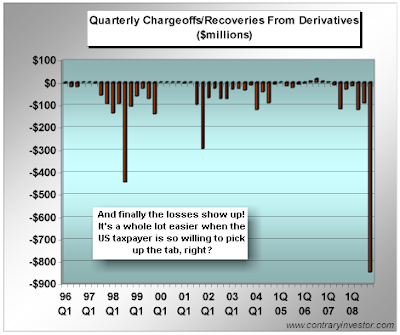One of the favorite retail analysts in the Cafe is Howard Davidowitz, and he is probably in the top ten overall. The accomplished shoppers in our crowd (predominantly the ladies for some reason, who have a canny sense of price and demand and store quality, whereas yours truly becomes overwhelmed by a numbing dread upon entering most retail establishments of the non-Home Depot or non-electronics persuasion) all tend to shake their heads in agreement when David speaks to the ups and downs of specific store chains and trends. I can think of no higher recommendation, for these are for the most part the front line consumers and they take their duties seriously.
Last night in speaking with a youngish acquaintance just completing law school (another one, alas) who was looking for advice on long term investments we observed that now is the time to remain liquid because 'the worst is yet to come.'
In 1999 I began an intense study of market bubbles and crashes as mentioned before. This included buying contemporary magazines and newspapers and reading them to see what was going through people's minds.
Today reminds me of the briefly sunny period in 1930-1 when most economists and public officials agreed that the Depression was already over and the economy was back on track. President Hoover dismissed a delegation of businessmen who came to Washington with ideas on stabilizing the economy with "Too late gentlemen, the slump is over."
There are few things from my childhood that I remember more vividly than grandmother's comments regarding this false recovery. "If we knew what was coming, we would have killed ourselves." This from as strong a person as I have ever encountered, with a faith that would break rocks. The Great Depression left an indelible mark, or more accurately scar, on her entire family, and my father's as well.
And I never heard the name "Franklin Roosevelt" from her lips without it being preceded by "God bless" followed by "he saved my family." Not all of her children unfortunately. She said she cried so much and so often that she was never able to cry again. And she did not, even at the end.
 Of course it was the second half of the great stock decline after the 1929 Crash that did the most damage, because this is when the carnage moved from financial assets and the banks into the real economy, with unemployment rising to 25% into the trough of the Depression in 1930.
Of course it was the second half of the great stock decline after the 1929 Crash that did the most damage, because this is when the carnage moved from financial assets and the banks into the real economy, with unemployment rising to 25% into the trough of the Depression in 1930.
Roosevelt came into office and began spending and innovating with programs to attempt to mitigate the impact of the economic collapse on America's families. Other countries, such as Italy, German and Japan, made their own political choices. We need to bear in mind that America itself came perilously close to a genuine brand fascism, and not the cartoon caricature presidential overreach cited by the corporate elites of the day. Hitler and Mussolini were the solutions proposed by the industrialists, they were their men, and they bankrolled them heavily.
And so here we are. What comes next is anyone's guess. But by now you should be accepting and internalizing the general themes, including the devaluation of the dollar down to levels that are probably still not believable, an activist central government nationalizing key industries, civil unrest and agitation, and a confusing cacophony of hysterical mumbo jumbo coming from media whores and corrupt officials.
The crisis is not over. We have just finished the beginning, the easy part, the initial collapse of the bubble. The worst is yet to come.
Watch the video of this commentary from Howard Davidowitz linked below if you get an opportunity. His delivery is priceless New York style.
"The Worst Is Yet to Come": If You're Not Petrified, You're Not Paying Attention
Aaron Task
May 15, 2009 09:31am EDT
The green shoots story took a bit of hit this week between data on April retail sales, weekly jobless claims and foreclosures. But the whole concept of the economy finding its footing was "preposterous" to begin with, says Howard Davidowitz, chairman of Davidowitz & Associates.
"We're in a complete mess and the consumer is smart enough to know it," says Davidowitz, whose firm does consulting for the retail industry. "If the consumer isn't petrified, he or she is a damn fool."
Davidowitz, who is nothing if not opinionated (and colorful), paints a very grim picture: "The worst is yet to come with consumers and banks," he says. "This country is going into a 10-year decline. Living standards will never be the same."
This outlook is based on the following main points:
With the unemployment rate rising into double digits - and that's not counting the millions of "underemployed" Americans - consumers are hitting the breaks, which is having a huge impact, given consumer spending accounts for about 70% of economic activity.
Rising unemployment and the $8 trillion negative wealth effect of housing mean more Americans will default on not just mortgages but student loans and auto loans and credit card debt.
More consumer loan defaults will hit banks, which are also threatened by what Davidowitz calls a "depression" in commercial real estate, noting the recent bankruptcy of General Growth Properties and distressed sales by Developers Diversified and other REITs.
As for all the hullabaloo about the stress tests, he says they were a sham and part of a "con game to get private money to finance these institutions because [Treasury] can't get more money from Congress. It's the ‘greater fool' theory."
"We're now in Barack Obama's world where money goes into the most inefficient parts of the economy and we're bailing everyone out," says Daviowitz, who opposes bailouts for financials and automakers alike. "The bailout money is in the sewer and gone."
The Worst Is Yet To Come (Video) - Howard Davidowitz









































